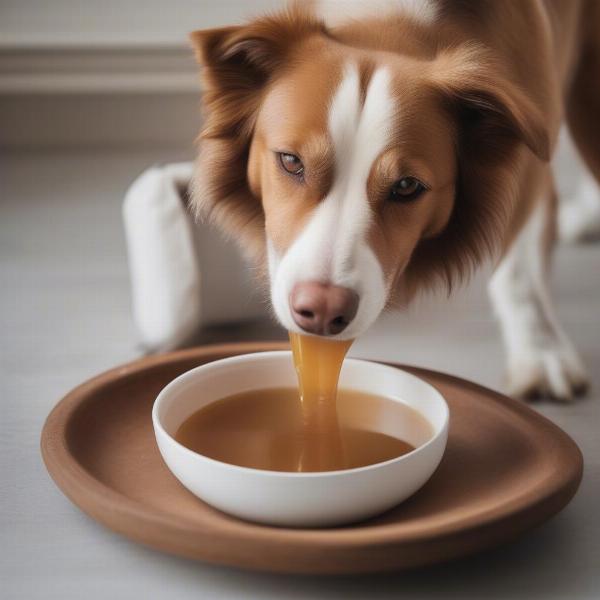Bone broth has gained popularity as a health supplement for both humans and dogs. But what about using the actual bones to make the broth? Are bone broth bones for dogs a safe and nutritious option? This article delves into the benefits, risks, and best practices for giving your dog bone broth bones.
Understanding the Benefits of Bone Broth for Dogs
Bone broth offers a range of potential benefits for dogs. It’s a rich source of collagen, which supports joint health, and also contains glucosamine and chondroitin, further contributing to cartilage strength and flexibility.  A dog drinking bone broth from a bowl. Additionally, bone broth can provide essential minerals like calcium, phosphorus, and magnesium, and the gelatin content can aid in digestion. For senior dogs or those with joint issues, bone broth can be particularly beneficial in improving mobility and comfort.
A dog drinking bone broth from a bowl. Additionally, bone broth can provide essential minerals like calcium, phosphorus, and magnesium, and the gelatin content can aid in digestion. For senior dogs or those with joint issues, bone broth can be particularly beneficial in improving mobility and comfort.
Which Bones Are Safe for Making Dog Bone Broth?
Not all bones are created equal when it comes to dog safety. Cooked bones are a definite no-no as they can splinter and cause serious internal damage. Raw bones, however, are generally a better option, but it’s essential to choose wisely. Large, dense bones like beef femur bones, knuckle bones, and marrow bones are ideal for broth-making. Avoid small, brittle bones like chicken or turkey bones, as these pose a choking hazard. low sodium chicken broth for dogs
Best Practices for Preparing Bone Broth with Bones
When preparing bone broth for your dog, it’s crucial to follow safe handling practices. Start with raw bones from a reputable butcher, ensuring they are free from any additives or seasonings. Thoroughly wash the bones before adding them to a large pot with water and apple cider vinegar (the vinegar helps extract nutrients). Simmer for at least 12 hours, or up to 24 hours, for maximum nutrient extraction. gelatin for dogs
Can Dogs Eat the Bones After Making Broth?
While some dog owners allow their dogs to chew on the bones after the broth is made, this can be risky. Prolonged simmering makes the bones brittle and more likely to splinter. best raw bones for dogs from butcher If you choose to let your dog gnaw on the bones, supervise them closely and remove the bones immediately if they start to break down. A better alternative for providing chewing satisfaction is to offer recreational raw bones separate from the broth-making process. are marrow bones good for dogs
Dr. Emily Carter, DVM, advises, “While bone broth can offer excellent nutritional benefits, always prioritize your dog’s safety. Supervise closely when giving bones, and when in doubt, err on the side of caution.”
Bone Broth Bones for Dogs with No Teeth
For senior dogs or those missing teeth, the benefits of bone broth are still accessible. Simply strain the broth thoroughly to remove any bone fragments. dog food for dog with no teeth You can then serve the broth as a tasty topper to their regular food, or freeze it into ice cubes for a refreshing treat.
Dr. John Davis, PhD in Animal Nutrition, states, “Bone broth is a great way to supplement a dog’s diet with easily digestible nutrients. For dogs with dental issues, offering the strained broth ensures they receive the benefits without the chewing risk.”
Conclusion
Bone broth bones can be a valuable addition to a dog’s diet, offering a range of health benefits. However, it’s vital to choose and prepare the bones correctly to ensure safety. By following the guidelines outlined in this article, you can confidently provide your dog with a nutritious and enjoyable treat.
FAQ
- Is bone broth good for puppies? Yes, bone broth can be beneficial for puppies, supporting their growth and development. However, introduce it gradually and consult with your veterinarian.
- How often can I give my dog bone broth? A few times a week is generally sufficient.
- Can I add vegetables to the bone broth? Yes, adding dog-friendly vegetables like carrots and celery can enhance the nutritional value.
- What should I do if my dog chokes on a bone? Seek immediate veterinary attention.
- Where can I find high-quality bones for bone broth? A local butcher is usually the best source for fresh, unprocessed bones.
- Can I store bone broth in the fridge? Yes, store strained bone broth in an airtight container in the refrigerator for up to 5 days.
- Can I freeze bone broth? Yes, freezing bone broth is a great way to preserve it for longer periods.
ILM Dog is your trusted international resource for dog care and nurturing. We offer expert guidance on everything from breed selection and health to training, nutrition, grooming, and more. Whether you’re a new dog owner or a seasoned pro, ILM Dog provides reliable, practical information to help you give your furry friend the best possible care. Contact us at [email protected] or +44 20-3965-8624 for personalized support.